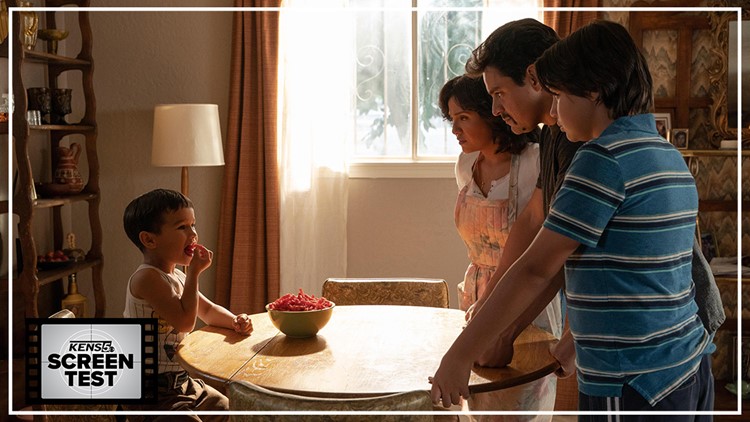TEXAS, USA — Note: This review was written out of the premiere of "Flamin' Hot" at the 2023 SXSW Film and TV Festival.
There’s no mistaking the “eureka!” moment of “Flamin’ Hot,” when the conveyor-belt rivers of a Californian Frito-Lay plant jolt from the familiar yellow of your humdrum potato chip to the electrifying scarlet of spicy Cheetos, a symbolic infusion of new lifeblood for a floundering corporation. Right on cue, a switch is flipped in both the screenplay and our movie-watching biologies—we exhale, relax and smile as the hero we’ve been following makes good on the pitch he’s believed in all along, setting the stage for the knot to be tied on a tidy story that never really convinces us of the hardships he endured along the way.
The hero is real-life Frito-Lay executive Richard Montañez (Jesse Garcia), and whether that visual flourish of yellow chips giving way to red ones is significant, satisfying or obvious will probably reflect what you hoped to get out of “Flamin’ Hot,” and which of your cinematic taste buds it eventually satisfies. Whether, in other words (and to risk the obvious analogy), you’re game for indulging in the momentary pleasures of this baseline-effective crowdpleaser like diving into a bag of Cheetos or will find yourself lamenting that actor-turned-director Eva Longoria’s narrative debut amounts to empty dramatic calories.
“Flamin’ Hot” (premiering at South By Southwest before landing on Hulu this summer) is a by-the-book story of American Dream derring-do focused on Richard, the product of a Mexican immigrant family who succeeded at flipping his blue collar white thanks to what he claims is devising the lightning-in-a-junk-food-bottle idea for Flamin’ Hot Cheetos (more on that later). Longoria occasionally enlivens things with fantastical flashes of energy, but nevertheless sticks with rudimentary biopic structures and well-worn tricks to tug us along through Richard’s adolescent life; unceasing voiceover establishes a smooth chronology but surface-level introduction, and attempts by the script (by Linda Yvette Chávez and Lewis Colick) to confront Mexican-American stereotypes by laying the foundation for Richard’s business acumen are spotty in their success.
“Flamin’ Hot” delightfully flips an outdated cliche on its head by portraying him as a burrito hustler for hungry white peers in school, for instance. But the unavoidable sense that this is all merely prologue inevitably smoothens over the pricklier aspects of life as a brown family in 1950s California. As an exploration of Latino life, “Flamin’ Hot” is más o menos onto something. There’s pride in how the cast approaches the material, and the movie subtly calls out traditional Hollywood depictions of cholos by depicting them as fathers, brothers and sons whose options are limited from the start (“I had to mind my gangster,” Richard reflects).
But it isn’t until Richard is hired as a janitor at Frito-Lay that Longoria finds her tonal groove, transposing her movie against the tried-and-true template of a high school underdog story. Here the standard cliques of jocks and geeks become the company’s executives and engineers, establishing an ecosystem built on passive intimidation and everyone sticking to their roles, the fear of flunking replaced by Reagan-era economic anxiety. Richard is warned not to mingle lest the status quo be thrown into disarray. Spoiler alert: He mingles anyway.
It’s perhaps here where we should clear the air on something the movie does not, not that it should be expected to. A deep LA Times report from 2021 found that Montañez, while he did start at Frito-Lay as a janitor before rising to the executive ranks, didn’t play so direct a role in introducing Flamin’ Hot Cheetos to the hungry masses. (For what it’s worth, the requisite here’s-where-they-are-now coda at movie’s end doesn’t make such a claim either.) Is this in itself troubling? Of course not; movies fib all the time. What it does do is put both the movie’s intentions and weaknesses into stark relief. Like “The Social Network,” “Steve Jobs” and “The Founder” before it, “Flamin’ Hot” is a story about entrepreneurial endeavor that’s less about the product than the producers—what they overcame or who they put down on the path to success.
They’re stories about identity, in other words, and when you recognize that you also start to notice the areas where “Flamin’ Hot” is a missed opportunity: The time is overripe for Hollywood movies about Mexican-American genius – and make no mistake, it took genius for Montañez to make the leaps he did without the advantages of privilege – and while Longoria’s breezy direction makes it easy to root Richard on, writers Chávez and Colick are frustratingly incurious about the systems he’s pushing back against. It’s enthusiastic but not particularly insightful.
Those dynamics are intergenerational as well as racial and capitalistic. The script deploys an old-school shorthand that Hollywood has taken advantage of for years in stories about discrimination; the casually racist manager whose eyes are opened at the perfect moment, the blind hate that makes cardboard bullies out of 15-year-olds and 55-year-olds alike, etc. But the more personal “Flamin’ Hot” gets – the closer Garcia gets to being able to match his charisma with something more internal – the colder the script’s shoulder. A fraught, weakly written relationship between Richard and his father (played by the magnetic Emilio Rivera) ostensibly fuels his endeavors, but any meaningful reckoning with tradition and expectations are left out of the recipe.
That’s disappointing, because for all the throwback charm of watching Richard teaching a company to adapt instead of the other way around, “Flamin’ Hot” is sorely in need of a more contemporary angle to separate it from the various other products it’s imitating. The first Frito-Lay employee Richard ever encounters is a grumpy secretary who insists (despite him never asking) that, no, they don’t have applications in Spanish. The only other time we see her, years have passed and she treats him like her godson. What about Richard broke through to her? Who’s to say? Like a bag of chips, “Flamin’ Hot” contains as much air as delicacy.
"Flamin' Hot" releases on Hulu and Disney+ Friday. It's rated PG-13 for some strong language and brief drug material. Runtime: 1 hour, 39 minutes.
Starring: Jesse Garcia, Vanessa Martinez, Emilio Rivera, Matt Walsh
Directed by Eva Longoria. Written by Linda Yvette Chávez and Lewis Colick.
---
>MORE SXSW COVERAGE:



